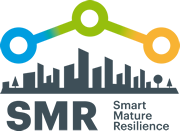Open European Day at Bonn Resilient Cities will bring European cities together to discuss their common challenges and share their successful solutions in a uniquely interactive event that sees cities taking centre stage and sharing cases from their most recent experiences in a conversational format. Innovation, co-creation and transformation in cities are the event’s three main themes and will frame the opening plenary and the break-out sessions. During the plenary, organizers ICLEI Europe and the European Environment Agency will open the day with the European Commission’s DG Research and DG CLIMA, the European Investment Bank, the Committee of the Regions and with the participating cities.
The event will include the OED Marketplace, where participants can share, display and discuss their latest ideas and results. The Marketplace will feature a Road to Adaptation Wall, an Adaptation Poetry Slam, where participants can present their organization or project in super-fast elevator pitches, and the day will finish with a musical exploration of the Sound of Adaptation.
The Open European Day programme is made up of interactive workshops where cities present a real-life challenge and explore solutions to these challenges with participants. On the topic of innovation, EASME and the European Commission will hear examples from Berlin Moabit and Valladolid on using technology for innovating adaptation. Ingrid Coninx (Wageningen University) and the European Investment bank will frame a discussion between Raffaella Gueze, City of Bologna and José Ferreira, City of Lisbon about innovative financing for climate adaptation, and Guimarães (Portugal) will share its experiences with innovation in multi-purpose nature-based solutions.
On the topic of co-creation, Athens (Greece) and the European Environment Agency will contribute on citizens as drivers of change, Peter Massini (City of London) will talk about adaptation and social inclusion and a discussion on co-creation with research and business will bring together contributions by Alistair Ford (University of Newcastle), Marjorie Breyton (Life DERRIS Project) and examples by the city of Vagos (Portugal), Valka (Latvia) and Exeter (UK).
Bratislava (Slovakia) and next year’s European Green Capital of Nijmegen (Netherlands) will share their impressions of how transformation manifests in a physical sense in their cities, facilitated by Birgit Georgi (Physical City Adaptation). The PLACARD project, the Provence of Potenza and the City of Vejle will explore how adaptation relates to the other urban development agendas, and a final Covenant of Mayors session on city transformation through administration will include contributions by Bilbao (Spain) and Copenhagen (Denmark).
Attendance at the Open European Day is free of charge to cities and registration is open at https://fs8.formsite.com/iclei12/form92/index.html. A draft programme is now available on the Bonn Resilient Cities website at http://resilientcities2017.iclei.org/open-european-day/.




